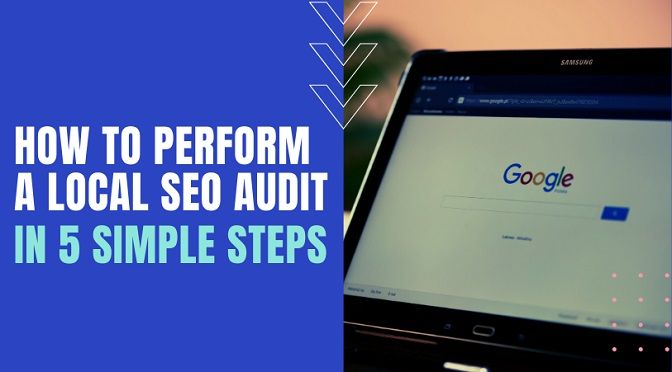Why perform a local SEO audit?
If you’re a local business, you’ve probably got some competition.
You might rank higher than your competitors in Google, or they might outrank you sometimes.
Understanding why you’re outranking your competitors or why they’re outranking you is critical to developing a local SEO strategy that will deliver results.
In the end, you want to generate more leads and win more customers, and that means you need to be visible to those local searchers when they come looking.
In this article, you’ll learn 5 steps to perform a local search audit for your business that will help you identify the actions you can take to stand out from the competition.
Identify valuable keywords for your business
When it comes to ranking in Google, it’s important to understand the search terms people use when they’re ready to engage local business, because focusing on these search terms is where you’ll want to focus first.
For example, when people type in ‘accountants Newcastle’ into Google, what results appear?
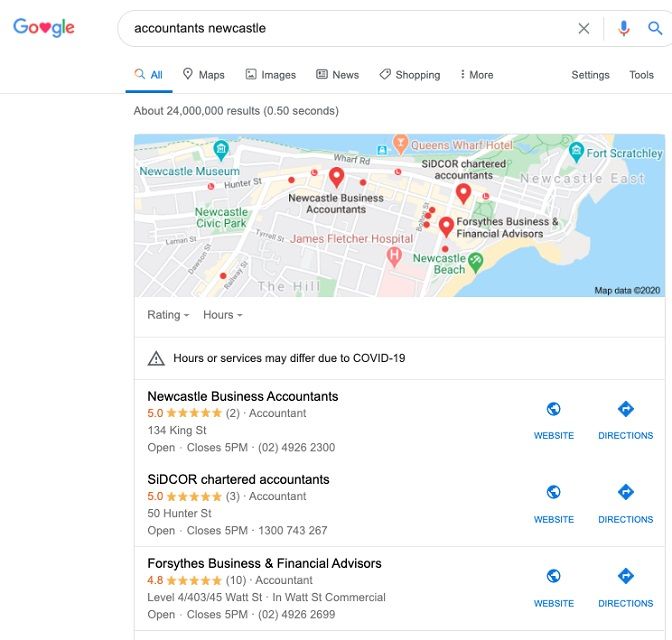
Google will most likely show a local map pack with three local business profiles from Google My Business followed by organic results from either local business directories or local business websites.
So Google thinks that ‘accountants Newcastle’ means the user is ready to engage a local business.
What results does Google return for the search term ‘how an accountant can save you tax’?
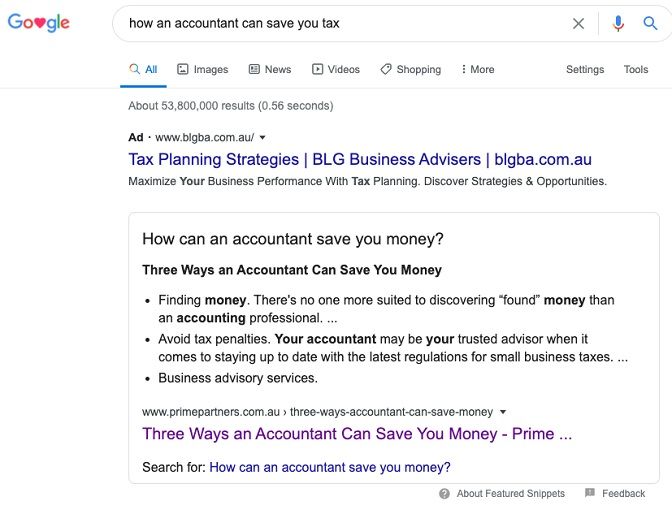
It returns a result that answers that specific question from a website outside of the local area. It doesn’t show any local businesses to contact directly and the websites within the organic results may not be as local as the previous search.
So find the keywords for your business that Google identifies as having high local intent and focus on those first. Once you’ve optimised for those primary search terms, you can start focusing on other search terms that may help create the additional website traffic, but may not generate as many direct leads for your local business.
Here’s a list of 4 keywords that an accountant in Newcastle might want to focus on when performing their first local SEO audit:
- Accountant Newcastle
- Tax accountant Newcastle
- Business advisor Newcastle
- Tax advisor Newcastle
You’ll want to focus on the main services you provide and check the search term both with and without the location in the search term using the techniques we cover in the next section.
Assess your current rankings
Knowing where you appear in Google for different search terms helps you identify how you compare with competitors in your local area.
In order to do that, it’s important to understand the two primary search results that Google displays to users performing local search queries.
Local map pack
When a user performs a search query that has high local intent, Google shows a map with a select list of local businesses. This is referred to as the ‘local map pack’.
Appearing in the local map pack for valuable search terms can deliver a lot of leads for your business because it’s usually the first thing users see. It also shows your businesses star rating from user reviews and links to contact you directly.
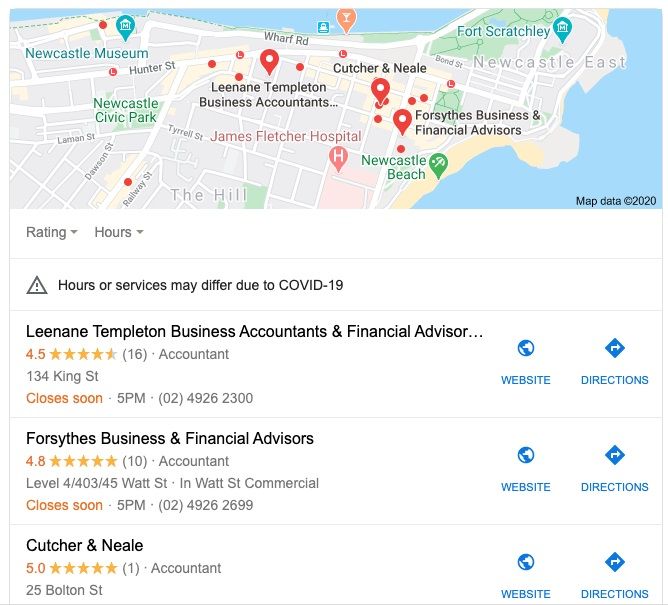
Organic results
The standard text results that appear are referred to as the organic results. These are still highly valuable and can generate a lot of leads, but once your business ranks outside the top 5, they become much less valuable.
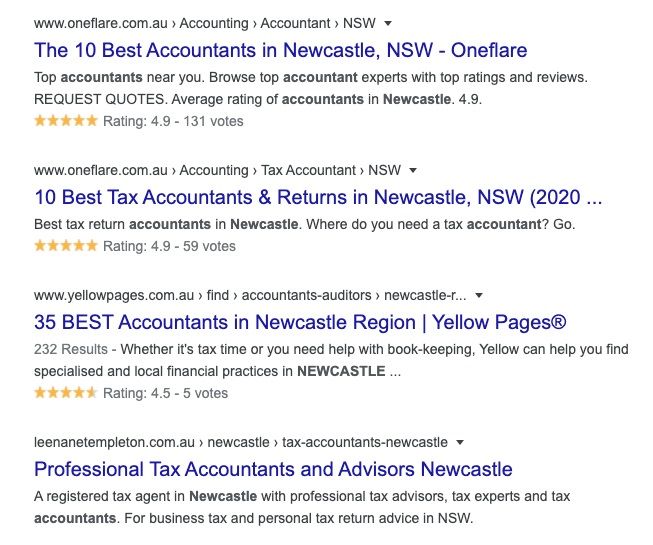
So you’ll want to check to see how you rank in both the local map pack as well as the organic results for your search terms.
It’s also important to understand that the user’s physical location can play a major role in determining which businesses appear in Google’s localised search results.
In order to control where you’re checking your results from, you can use a tool like Bright Local’s Local Search Result Checker.
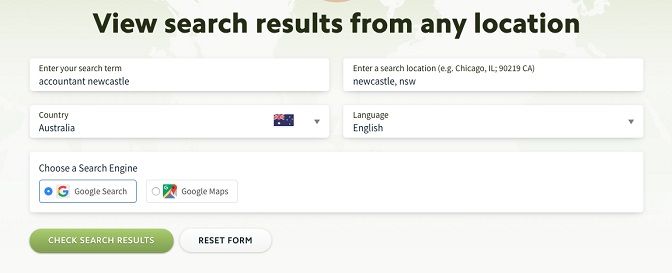
Instead of only being able to see what searchers would see from your current location, you can use this tool to check what they see from any location.
The tool also allows you to search on Google Maps so you can see how your business ranks there as well.

Check each page until you find your business and write down where you appear. Hopefully, you’re not too far down the list.
Now that you know where you’re appearing in the search results compared to your competitors, it’s time to check your website to see if you’re sending the right signals to Google to optimise your website to rank for those local search terms.
Location signals
When a user searches for ‘accountants Newcastle’, Google delivers results to the users that it thinks are most relevant for that search term.
So if you’re a local business that primarily serves customers in your local area, it makes sense to tell Google what that local area is by referencing it within important elements on your website.
You can refer to a detailed local SEO checklist, but the main elements are below to keep things simple.
Checking your website
There are a lot of places where you can optimise your website, but here are the key places to reference your location on your web pages to ensure your site has a basic level of location optimisation:
Title – The text that appears in the browser tab on the page.
H1 – The main heading on your web page that describes the primary topic of the page.
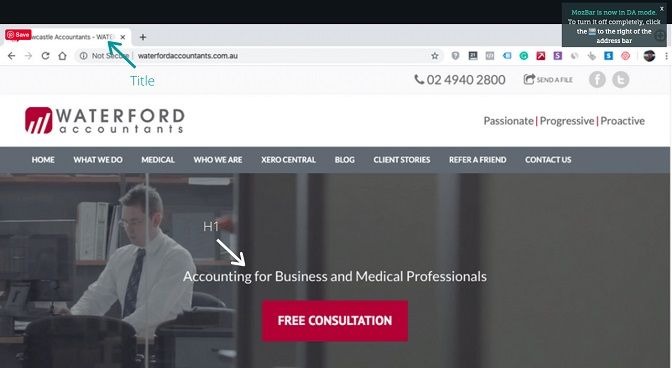
The above website is not providing any location signals within the primary heading, which makes it more difficult for Google and users to get the right location signals.
You should also include your physical address and phone number in your website’s footer and on your contact page.
Location signals on other websites
It’s important to realise that Google uses location signals about your business that it gets from other websites as well to determine how relevant you are to users in your local area.
One of the most important signals comes from local business directories like Google My Business, Facebook, Yellow Pages, True Local, Local Search and others.
By having your business name, address, and phone number consistent across all of these directories, Google can be confident that your business is located where you say it is.
Review signals
Reviews play a major role in local rankings because Google wants to show results users will find helpful. So if you’re a local business with lots of great reviews, Google will more likely display your business higher within the search results.
Simply check to see how many reviews your business has on your Google My Business profile and compare that with your local competitors. The number and quality of the reviews is an important factor.
It’s also important to realise that the content of those reviews and whether or not you responded to them is important as well. So check your reviews to see if the user included any of your primary search terms like ‘They did a great job preparing my business taxes’.
Although you can’t always control the quality or content of the reviews, it’s important to realise that review signals can make a big difference when it comes to ranking, especially within the local map pack.
Checking your domain and page authority
Google wants to display results that most closely match what the user is searching for. In order to do that, it uses signals that it gets from across the internet to tell it which pages are most likely to answer the user’s search query.
That’s where domain and page authority comes in. Google uses a very complex and secret algorithm to determine how well your web page can answer the search query.
One of the key factors in that algorithm is how many other websites point to your website, and more specifically, to your page.
To put it in simple terms, if no other websites think your business or your website content is worth sending their visitors to, Google probably won’t think it’s worth sending their users to either.
Now nobody except Google knows how their algorithm works, but the team over at Moz developed scores that closely predict how Google will rank your site relative to your competitors.
Those scores are called Domain Authority and Page Authority. The scores range from 0 to 100 with 0 representing websites and pages that would be least likely to rank and 100 representing websites and pages that would be most likely to rank.
It’s important to remember that your likelihood of ranking well in Google is relative to your local competition, so you may not need a very high score to rank well if you provide the right location signals.
You can also check your competitor’s scores to see how you’re positioned relative to them.
Take action
Now that you’ve performed a local SEO audit on your own website, it’s time to take action.
If you discovered that you rarely mention your location on your website, find relevant places to mention it.
If you don’t have many reviews on Google, start asking customers to leave you reviews and respond to the reviews when they come in.
If you realised that you either don’t have any local business citations, create some. Or if they’re wrong, fix them.
And finally, if your authority scores are below your local competition, take steps to improve your authority by building high-quality backlinks to your website and sharing valuable local content.
